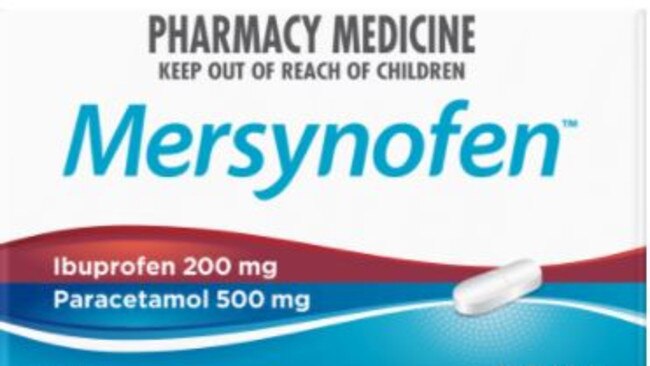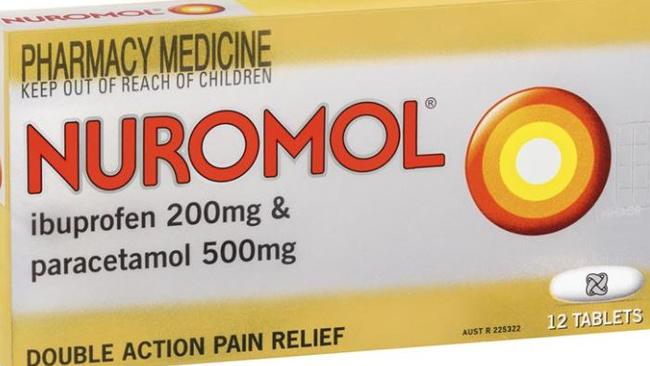Over-the-counter codeine change in Australia comes with alternatives and warnings
CODEINE medication has been taken off the shelves across Australia from today. There are alternatives as doctors warn against shopping around just to get a script.
Health
Don't miss out on the headlines from Health. Followed categories will be added to My News.
A RANGE of codeine medicines have been taken off the shelves at chemists across Australia, forcing millions to rethink their pain relief method.
From February 1, 2018, medicines that contain low-dose codeine are no longer available without prescription in pharmacies.
This is what’s happened and how it will affect Australians.
WHICH MEDICINES ARE AFFECTED?
The medicines affected include codeine-containing combination analgesics known to consumers as Panadeine, Panadeine Extra, Mersyndol, Nurofen Plus, Panafen Plus, Aspalgin, Codis, Dispirin Forte and some pharmacy generic pain relief products.
It also refers to codeine-containing cough, cold and flu products including Codral Original Cold & Flu, Demazin Day & Night Cold & Flu and some pharmacy generic cough, cold and flu medicines.
WHO HAS ENFORCED THIS CHANGE?
The changes to the way codeine-based medicine is dispensed is part of a decision by the Therapeutic Goods Administration. It moves the drug from Schedule 2 and 3 to Schedule 4 (prescription only). Australian Medical Association President (AMA), Dr Michael Gannon, has said he fully supports the independence of the TGA in making decisions about medicines scheduling, including for codeine.
RELATED: Chemists accused of putting profits ahead of patient safety

WHY ARE THEY NO LONGER OVER-THE-COUNTER?
It is part of a push to try and curb the nation’s misuse and abuse of codeine, which has led to addiction and the overarching opioid crisis.
Federal Health Minister Greg Hunt has also insisted up to 100 lives a year will be saved now codeine has been taken off store shelves.
AMA Vice President Dr Tony Bartone also told News Corp Australia that low doses of codeine are ineffectual.
“The TGA has a role to protect the public and ensure the safety of all medications,” he said.
“Just because you can make it and manufacture it doesn’t mean it can be sold over-the-counter. The TGA has to make sure all the products have a therapeutic guideline about when and where to use them and the safe ways to use them.”
WHAT EVIDENCE EXISTS ABOUT CODEINE?
Medical research suggests over-the-counter low-dose (
Dr Gannon said: “There is no evidence that low-dose codeine provides any benefit beyond placebo.”
ARE THERE ANY ALTERNATIVES?
Patients who have short term pain will still have access to alternative over-the-counter painkillers, which are seen to be more effective than low-dose codeine, but without codeine-associated risks, Dr Gannon said.
Commonwealth Chief Medical Officer Professor Brendon Murphy also stated recently that paracetamol and anti-inflammatory medications, alone or in combination, are adequate treatments acute pain.

There is evidence to suggest that paracetamol/ibuprofen combinations available as a single pill for short-term pain management are effective. This can be an option for those who do not get enough pain relief from paracetamol alone. Alternative brands on the market include Maxigesic, Nuromol and Mersynofen. Consumers should consult their GP or pharmacist first before using an alternative.
ARE THERE ANY DANGERS TO THESE ALTERNATIVES?
There may be many Australians who should not take ibuprofen at all, or only take it with caution, given their medical history and current situation.
While paracetamol and ibuprofen can both be purchased over-the-counter, neither is free of safety risks. Prolonged use or double-dosing can carry serious health risks. It can also mean underlying conditions are not treated properly. Consumers should consult their GP or pharmacist first. Having bed rest and using hot or cold packs with paracetamol alone for example may be enough to treat pain symptoms.
Dr Bartone told News Corp that if you have acute pain, you should have a conversation with someone. A pharmacist or doctor should go through the symptoms and work out a plan to help you.

“If it’s a case of ‘I sprained my ankle what should I take?’ you could say a range of options of over the counter medications. The ibuprofen/paracetamol combination would be ideal,” he said.
“But if the symptoms are there and not improving, then you have to move to a second phase, and there are a range of options to try and correct the problem or it gets entrenched.”
Dr Bartone said those with reflux, allergies to aspirin or asthma are not advised to take ibuprofen. But they are not alone.
“There’s more warnings than just those, it could also interfere with current medications a person is on,” he said.
“Have a conversation with a GP or pharmacist before taking anything for the first time.”
WHAT ABOUT OTHER NON-CODEINE ALTERNATIVES?
Depending on your situation, there may be a variety of alternatives on offer. Some exercise and physiotherapy is recommended to many patients by their GPs. National President of the Australian Physiotherapy Association, Phil Calvert said: “The good news is that physiotherapy is proven to provide effective pain relief, which treats rather than simply masks the underlying cause of pain.”
Healthy Life Nutritionist & Western Herbal Medicine Practitioner Carmen Alvarado, said there were other options that could help soothe pain. These include natural remedies with anti-inflammatory properties such as curcumin, tumeric, white willow bark, Peony root, fish oil and magnesium, which can help.

WHAT SHOULD I DO IF I’M IN PAIN AND USE CODEINE-BASED MEDICATION?
Firstly, it is best to see your GP and ask for their advice on a suitable pain management plan. If it is an emergency situation though, then it may be best to call Triple-0 immediately.
WHAT IF I SUFFER FROM CHRONIC PAIN?
According to Pain Australia’s website, chronic or persistent pain which occurs on a daily or recurring basis, is a common condition affecting up to one in five Australians and one in three older Australians. Chronic pain is estimated to cost Australia more than $34 billion per year and is the leading cause of forced early retirement in people of working age.
Pain Australia suggests looking into pain management solutions that include daily stretching, walking, pacing actvites in your day, relaxation techniques like yoga or meditation, practising mindfulness, sleep, good diet and exercise and even applying distractions like putting on music can reduce a patients’ pain focus.
Dr Bartone said that people must understand chronic pain needs to be managed. “It’s not just a case of taking a pill first, it’s more than popping the pill. Talk to a doctor and take the advice to a phamacist if they give you an option that’s either over-the-counter or a script,” he said.

WHAT ABOUT SHOPPING AROUND FOR A DR WHO’LL GIVE ME A SCRIPT?
Dr Bartone said if people go looking for a doctor just to supply them with a prescription for a substance, they will be seeing many doctors who all know the same thing — there should be a plan in place with an appropritate line of treatment.
While he acknowledges there may be “initial teething” for some people, having a conversation once with a doctor who then supplies you with a plan, you won’t constantly be coming back to doctors for scripts.
“It’s about managing the condition,” he said. “If you’re taking medication everyday and not controling the pain there’s something being missed there. It needs a plan to address the pain in a timely manner. Once you’ve done it you may not need to go back for it. You’ll be going to the pharmacy less times as you’ll have a more sustained, long term control over the pain. It will be supervised and reviewed by your doctor.”

WHAT IF I HAVE COLD AND FLU SYMPTOMS?
If you have these symptoms, there are other alternatives that can be purchased over-the-counter that don’t contain codeine. Ask your pharmacist or GP for further advice.
WHAT ABOUT IF I HAVE PERIOD PAIN OR A MIGRAINE?
Dr Bartone told News Corp Australia that if it’s a case of you going to your doctor and saying: “I get period pains every month’ or ‘I get migraines when I miss a meal’, that’s a conversation that requires more of a plan to be put in place.”
“Once pain is chronic and more regular you really should sit down with your health professional to talk about it, what’s causing the pain and what options are there and then what phramalogical options there are.” Period pain and mirgraines can be treated with other measures and over-the-counter options that should be discussed with your GP or pharmacist.
WHAT ABOUT GETTING CODEINE OVERSEAS?
Australia’s over-the-counter ban will match others in the US and UK. Dr Bartone said that we are just “following world’s best practice”. A prescription is required for codeine products in some other European countries including Austria, Belgium, Germany and Italy, as well as Japan and the United Arab Emirates.



